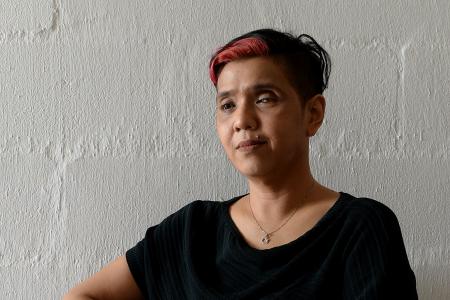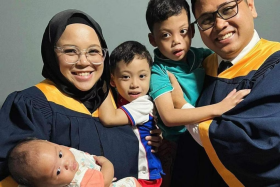Woman loses her sight after superbug infection
She had high fever, then, shockingly, she lost her sight. The customer service officer felt no pain in her eyes, but saw more eye floaters
When she woke up and could not see with her left eye and could hardly open her right eye, she thought she was dreaming.
But the dream turned into a nightmare as she sat on the edge of her bed, rubbing her eyes again and again, only to find that she still could not see.
A horrified Madam Siti Hajar Abdul Gaffar, 44, took a taxi to the Accident and Emergency department at Changi General Hospital (CGH) on Jan 23.
"All I could see out of my left eye was pitch darkness. I could not see even the tiniest ray of light," she said.
Madam Siti, a single mother of two children aged 11 and seven, added: "I could still see with my right eye, but it was blurry and there were black spots in my vision."
The customer service officer in a food distribution company was diagnosed with Klebsiella pneumoniae, which is caused by a superbug that is resistant to antibiotic treatment and that causes life-threatening infections among those susceptible to it, such as diabetics or patients with weakened immune systems.
It does not normally infect healthy individuals.
Madam Siti, who is diabetic, was told that the bacteria had spread to her left foot, her kidney, her liver, her lungs as well as her eyes, and she was admitted into CGH.
On Jan 20, three days before the diagnosis, Madam Siti had gone to a polyclinic with a high fever.
"The doctor initially thought it was dengue, so I had to take a blood test.
"After that, they said it was just a normal fever, so I was given antibiotics and the rest of the day to rest at home," she said.
Speaking from her two-room rental flat in Eunos, Madam Siti said she had not felt any pain in her eyes.
But she had noticed a sudden increase in the number of eye floaters or tiny "cobwebs" that appear in her field of vision.
"I didn't feel any pain or nausea. That was why I felt so shocked when I woke up that day unable to see with my left eye," said Madam Siti.
Two days later, she underwent surgery to replace her left eyeball with a glass implant. She also had a minor operation to remove pus from her left foot.
"The doctor initially told me that he was not sure how much the infection had spread to my right eye and there was still a fighting chance that I'd be able to use it," she said.
But her hopes were dashed when she could not see with her right eye the next day.
Madam Siti said: "For 44 years, I could see perfectly, then everything went black.
"All I could think of was my children and how I am going to take care of them from now on."
She was discharged from hospital on March 25 and was accompanied home by a caregiver from CGH, who stayed with her for two weeks to help her adjust to her sudden disability.
Describing her family as "loving and complete", Madam Siti said: "As a single mother, I never had to depend on anyone. I checked my children's homework and got them ready for school all by myself.
"I am going to miss a lot of big moments in my children's lives. I can't sign school consent forms or attend parent-teacher meetings any more. The thought that our lives had changed in a heartbeat broke my heart."
Madam Siti's close friend of 14 years, Madam Nur Azreenawaty Mohamid Hamid, 34, told TNP that it is the first time her friend has had to rely on other people.
FREE TINGKAT DINNER
"She is a very strong and positive woman and rarely asks for help. No one expected this to happen to her," she said.
In a bid to help her friend, Madam Azreenawaty approached Ummi Abdullah catering service.
"I was very happy when they offered to cater dinner to kak Siti's family on weekdays for free. It will at least ease her daily burden," she said.
Madam Siti is still employed, but has taken time off work to cope with her sudden loss of vision.
"The biggest challenge used to be dressing myself, but I've got better at it," she said.
"I listen to prayer calls on the radio to tell the time and count my steps everywhere I go, I am still trying to figure out a system for my life.
"Sometimes you don't appreciate the things you have until you don't have them any more. I am blind now, but I am determined not to let my children's lives be compromised by my disability," she said.
I am going to miss a lot of big moments in my children's lives. I can't sign school consent forms or attend parent-teacher meetings any more. The thought that our lives had changed in a heartbeat broke my heart.
- Madam Siti Hajar Abdul Gaffar
NORMALLY HARMLESS SUPERBUG
Although an uncommon infection, Klebsiella pneumoniae is also not very rare, especially among diabetics, two doctors told The New Paper.
Diabetics, who are known to have weak immune systems, are more prone to this "superbug", which tends to spread in the body through the bloodstream.
A Changi General Hospital consultant who specialises in infectious diseases, Dr Suma Rao, said that Klebsiella is a bacteria that normally lives in human intestines, where it does not cause harm.
However, when it spreads to other parts of the body, it can cause a range of illnesses such as liver abscess and urinary tract infection.
"When that happens, the infection produces pus that can usually be easily removed," said Dr Rao.
"Unfortunately, in Madam Siti's case, the infection had spread to her eye, which has a jelly-like substance that surrounds it. Once it grows in the eye, it becomes very difficult to treat as it is harder for the antibiotic to penetrate through the substance."
Dr Natasha Lim, who is based at Mount Elizabeth Novena Hospital, said that the symptoms may vary.
"When the eye is infected, the symptoms usually include blurred vision, high fever and floaters. The eye will also look red, inflamed and shrivelled up," said the medical director of Dr Natasha Lim Eye Centre.
"Usually, we try to salvage the eyeball and treat the infection with antibiotics first. If the condition worsens, then as a last resort, we will have it removed and replaced with an artificial one."
Dr Lim said the infection rarely attacks healthy people, but she urged everyone to be vigilant. "Less than 1 per cent of diabetics will suffer from this condition, especially with advanced potent antibiotics, but that does not mean the rest of us are definitely spared," she said.
ADVICE FROM SAVH
The biggest impact of sudden blindness to people who are not born blind is to their psyche, said a spokesman for the Singapore Association of the Visually Handicapped.
"They are usually traumatised and will take a period of adjustment before they are able to come to terms with it," she said.
She advised Madam Siti's family to be encouraging and supportive to boost her morale.
"It will spur her to learn things like orientation and mobility, visual rehab and eventually skills development to lead a self-sustainable life," the spokesman added.
Depending on the degree of visual impairment, blind people can still work to support themselves.
"Many of them turn to something simpler like busking, selling tissue (paper), becoming masseurs or servers, or perhaps even telemarketing," she said.
Get The New Paper on your phone with the free TNP app. Download from the Apple App Store or Google Play Store now


